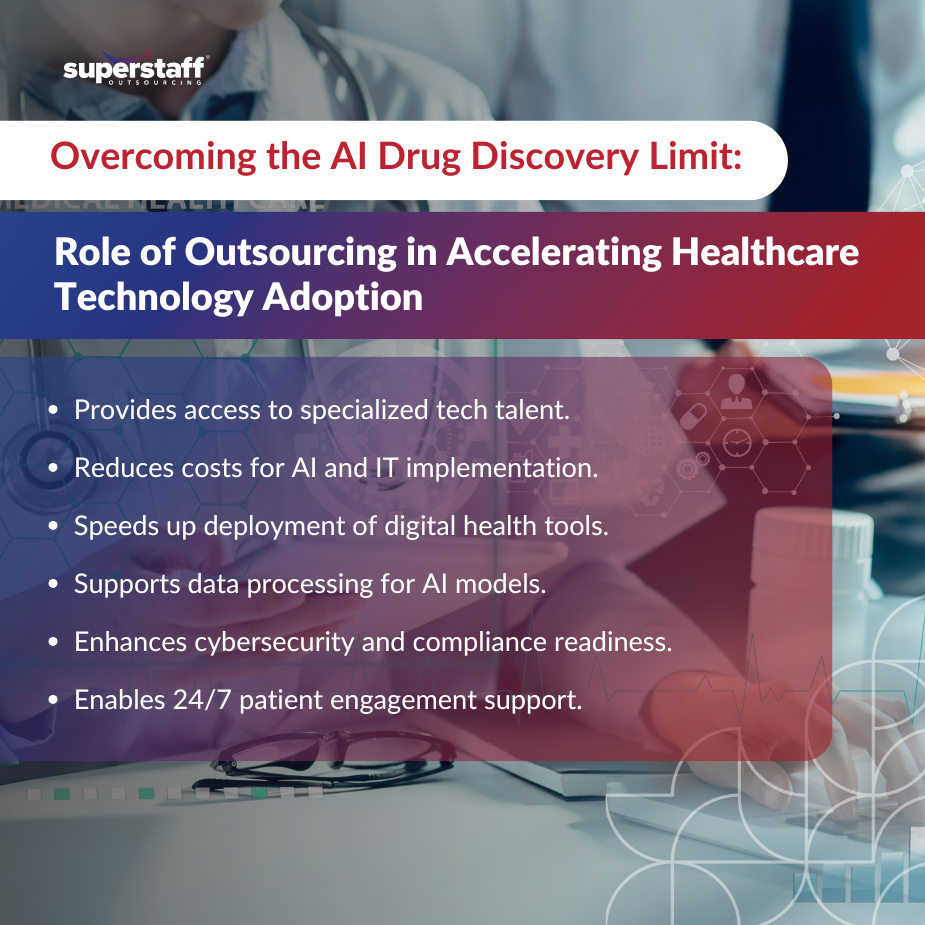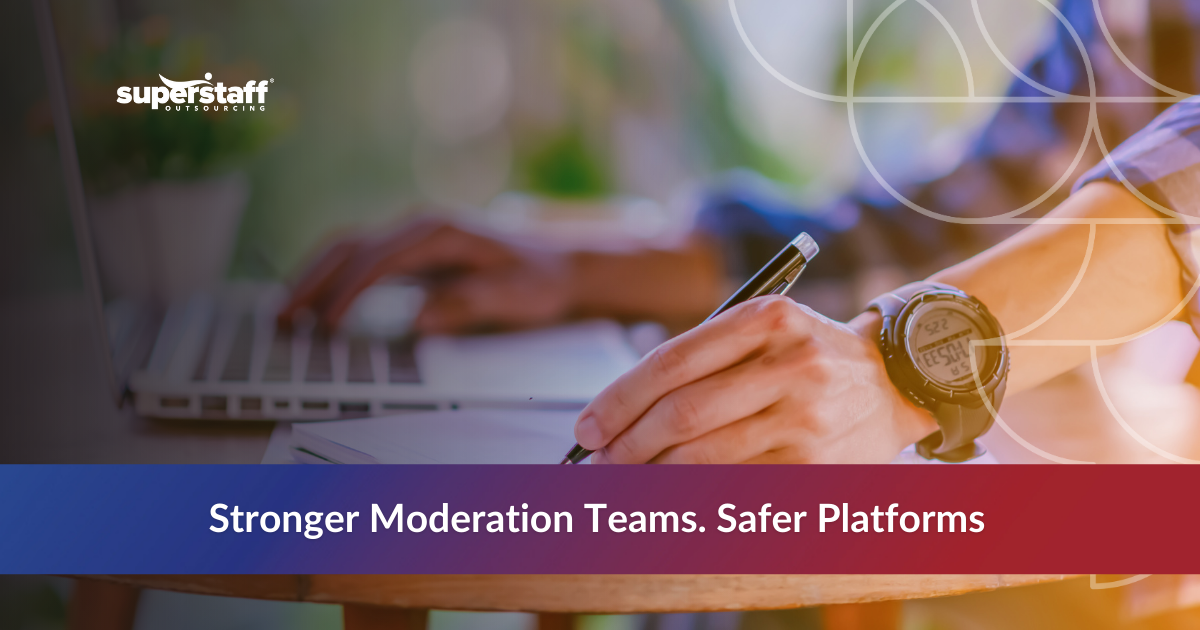
Healthcare innovation is moving at breakneck speed. From AI-driven drug discovery that compresses years of research into months, to precision medicine that tailors treatment plans based on genetic data, the industry is undergoing a radical transformation. Yet even as these breakthroughs promise a new era of care, they also reveal the ai drug discovery limit—a threshold where technological potential outpaces in-house capabilities, infrastructure, and compliance readiness.
To truly benefit from these advancements, healthcare organizations must find ways to bridge that gap. That’s where outsourcing steps in—not as a cost-saving fallback, but as a strategic enabler. By tapping into external expertise, specialized infrastructure, and globally distributed support, companies can fast-track adoption, reduce operational bottlenecks, and stay competitive in an increasingly tech-driven ecosystem.
In this blog, we explore the latest innovations in healthcare—from AI-enabled R&D to personalized care models—and unpack how outsourcing empowers organizations to scale these technologies with speed, security, and confidence.
AI and Machine Learning Are Redefining Drug Discovery
Artificial intelligence and machine learning are fundamentally changing how pharmaceutical companies develop new drugs. Rather than relying solely on traditional laboratory testing and trial-and-error methods, firms now use AI models to simulate molecular interactions and predict the efficacy of potential compounds.
Companies like Atomwise, Insilico Medicine, and DeepMind’s AlphaFold are leading the charge in this space. Atomwise uses deep learning to predict how small molecules will interact with proteins, allowing scientists to screen billions of compounds in a fraction of the time. AlphaFold has revolutionized protein structure prediction, a critical component of understanding disease mechanisms.
Yet despite these achievements, the ai drug discovery limit becomes apparent when scaling these models requires massive data processing, specialized algorithms, and cross-disciplinary expertise. This is where outsourcing becomes critical. Offshore data scientists and computational biologists can efficiently handle modeling and analytics workflows, making it feasible for firms to pursue more R&D paths simultaneously.
But innovation doesn’t stop at the lab—it’s also reaching individual patients in the form of precision medicine.
Precision Medicine Is Transforming Treatment Personalization
Beyond artificial intelligence trends in healthcare, precision medicine is another development shaping the industry’s future. This innovation is pushing healthcare away from one-size-fits-all treatment and toward individualized care. By leveraging technologies like next-generation sequencing (NGS), EHR-integrated platforms, and wearable diagnostics, doctors can tailor therapies to genetic markers, lifestyle, and environmental factors.
These advanced diagnostics generate massive volumes of data, demanding sophisticated data infrastructure. Outsourcing plays a pivotal role in managing genomic databases, training AI models, and integrating AI-enabled tools with hospital systems.
BPO and KPO providers offer 24/7 research support, faster analysis pipelines, and HIPAA-compliant data handling, which accelerates the clinical decision-making process. By removing bottlenecks in data processing and model validation, outsourced partners help healthcare providers reduce time-to-market for precision-based treatments.
Supporting these technologies requires robust IT infrastructure and real-time data interoperability—areas where outsourcing shines.
IT Outsourcing Powers Digital Health Transformation
The adoption of digital health tools hinges on the ability to integrate complex IT systems quickly and cost-effectively. Outsourcing IT services enables healthcare organizations to leverage specialized teams for managing these demands, from cloud migration to interoperability with legacy systems.
Common applications include EMR/EHR integration, telehealth platform development, and cybersecurity management. Each of these projects requires both in-depth technical expertise and a domain-specific understanding of healthcare regulations.
Outsourced IT teams offer scalability and faster project timelines while ensuring risk mitigation through standardized development protocols. More importantly, they bring continuous innovation to the table by updating systems with the latest artificial intelligence trends in healthcare and supporting advancements in how AI is transforming drug discovery processes.
Beyond development, outsourcing supports long-term operations, including AI model retraining and regulatory maintenance.

Ensuring Compliance and Security Through Outsourcing
As healthcare organizations grow more reliant on digital technologies, the need for robust compliance and data security becomes paramount. Outsourcing providers offer significant advantages in this area, especially those certified in HIPAA, GDPR, and ISO standards.
Knowledge Process Outsourcing (KPO) and Legal Process Outsourcing (LPO) firms help ensure global regulatory compliance, especially for companies operating in multiple jurisdictions. These teams specialize in quality assurance, data integrity, and audit preparation, relieving the burden on internal staff.
Rather than expanding in-house compliance departments, many medtech and pharma firms outsource these functions to reduce costs, streamline audits, and increase accuracy.
As technology empowers healthcare, so does the need for strong patient engagement strategies—and outsourcing plays a role here, too.
Patient Engagement Through Outsourced CX Teams
Patient engagement is no longer limited to the doctor’s office. Today, wearables, mobile health apps, and AI chatbots are creating continuous care experiences that require responsive, multilingual support.
Outsourced customer experience (CX) teams are uniquely positioned to meet this demand. They provide 24/7 assistance, chronic care coordination, and remote monitoring support—all in a culturally aligned, empathetic manner.
Multilingual agents can guide patients through device setup, explain treatment protocols, and provide tech troubleshooting. This level of real-time interaction is critical for patient adherence, especially in chronic disease management.
These innovations reflect the future, but many organizations struggle to keep up without external support.
Why Outsourcing Is a Strategic Enabler for Innovation
Innovation in healthcare is not just about technology—it’s about implementation. Successful adoption of AI, big data, and personalized platforms requires agility, cross-functional talent, and ongoing iteration.
Outsourcing addresses all of these needs. It helps firms bridge talent gaps with global experts, reduce time-to-market for new solutions, and maintain continuity in an industry where regulations, data standards, and technologies are constantly evolving.
Healthcare leaders gain the ability to pilot programs without large upfront investments, scale proven initiatives globally, and pivot quickly based on real-time insights—all thanks to the flexibility outsourcing provides.
Let’s recap the key ways outsourcing powers healthcare’s tech-forward future.
Breaking Past the AI Drug Discovery Limit With the Right Partners
Healthcare’s transformation through AI, data, and precision care is only possible with the right partnerships.
Outsourcing has evolved into a strategic cornerstone of healthcare innovation. From overcoming the AI drug discovery limit to enabling personalized care and streamlining IT systems, external partners offer the expertise, scalability, and compliance needed to thrive in a fast-evolving landscape.
Whether it’s managing genomics data, deploying cloud-based telehealth solutions, or enhancing patient engagement through multilingual support, outsourcing enables healthcare organizations to act swiftly, efficiently, and with confidence.
Partner with SuperStaff to support your healthcare innovation journey—from IT to patient engagement—with a trusted, tech-savvy outsourcing team.






